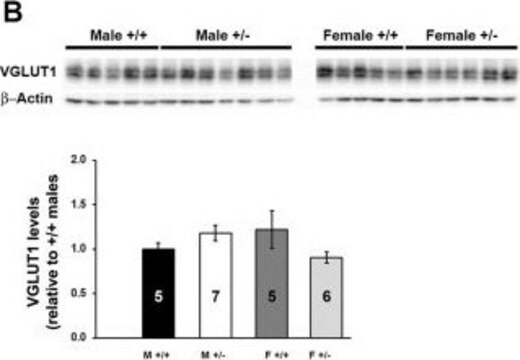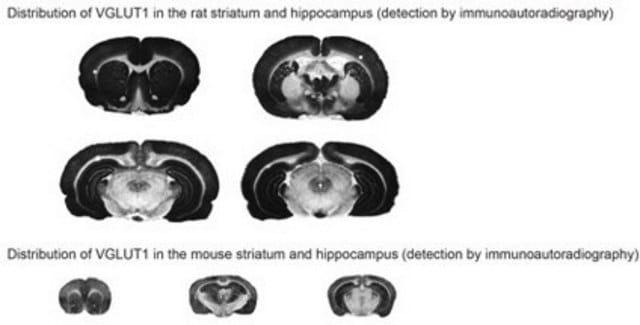AG208
VGT 1 Peptide
control for AB5905, liquid
Synonym(s):
VGLUT1, BNPI
Sign Into View Organizational & Contract Pricing
All Photos(1)
About This Item
UNSPSC Code:
12352203
eCl@ss:
32160702
NACRES:
NA.42
Recommended Products
General description
Synthetic peptide from rat VGLUT1 protein.
VGLUT1 is expressed in a subset of glutamate neurons and transports glutamate into native synaptic vesicles from the brain, exhibiting a conductance for chloride that is blocked by glutamate. Vesicular glutamate transport has a substantially lower apparent affinity than the plasma membrane excitatory amino acid transporters. Glutamate transport by VGLUT1 is saturated with a K(m) of approximately 2 mM, in the same range as transport by synaptic vesicles. Finally, plasma membrane glutamate transporters recognize both aspartate and glutamate as substrates, whereas VGLUT1 does not recognize aspartate.
Application
For use in blocking the reactivity of AB5905.
Optimal working dilution must be determined by the end user.
Optimal working dilution must be determined by the end user.
Legal Information
CHEMICON is a registered trademark of Merck KGaA, Darmstadt, Germany
Storage Class Code
12 - Non Combustible Liquids
WGK
nwg
Flash Point(F)
Not applicable
Flash Point(C)
Not applicable
Certificates of Analysis (COA)
Search for Certificates of Analysis (COA) by entering the products Lot/Batch Number. Lot and Batch Numbers can be found on a product’s label following the words ‘Lot’ or ‘Batch’.
Already Own This Product?
Find documentation for the products that you have recently purchased in the Document Library.
Synaptotagmins I and II in the developing rat auditory brainstem: Synaptotagmin I is transiently expressed in glutamate-releasing immature inhibitory terminals.
Alan P Cooper,Deda C Gillespie
The Journal of Comparative Neurology null
Alain C Burette et al.
The Journal of comparative neurology, 520(7), 1481-1492 (2011-11-22)
The sodium-driven chloride/bicarbonate exchanger (NDCBE), a member of the SLC4 family of bicarbonate transporters, was recently found to modulate excitatory neurotransmission in hippocampus. By using light and electron microscopic immunohistochemistry, we demonstrate here that NDCBE is expressed throughout the adult
Seth L Shipman et al.
Proceedings of the National Academy of Sciences of the United States of America, 109(47), 19432-19437 (2012-11-07)
The transsynaptic complex of neuroligin (NLGN) and neurexin forms a physical connection between pre- and postsynaptic neurons that occurs early in the course of new synapse assembly. Both neuroligin and neurexin have, indeed, been proposed to exhibit active, instructive roles
Ramon Guirado et al.
Heliyon, 4(6), e00669-e00669 (2018-07-14)
The quantification of the expression of different molecules is a key question in both basic and applied sciences. While protein quantification through molecular techniques leads to the loss of spatial information and resolution, immunohistochemistry is usually associated with time-consuming image
Sean P Masterson et al.
The Journal of comparative neurology, 515(6), 647-663 (2009-06-06)
Dorsal thalamic nuclei have been categorized as either "first-order" nuclei that gate the transfer of relatively unaltered signals from the periphery to the cortex or "higher order" nuclei that transfer signals from one cortical area to another. To classify the
Our team of scientists has experience in all areas of research including Life Science, Material Science, Chemical Synthesis, Chromatography, Analytical and many others.
Contact Technical Service





